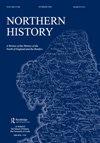1786-1801年约克郡煤田的抗议、父权制和生活水平
IF 0.2
3区 历史学
Q2 HISTORY
引用次数: 0
摘要
这篇文章为工人为什么在工业革命中抗议提供了一个新的视角。它描绘了1786年至1801年间,在食品成本波动的情况下,如何采取抗议行动,特别是工会协调的罢工,以维持或提高约克郡煤矿工人的生活水平。这篇文章还阐明了一些家长式的煤矿主是如何通过支付高工资来避免骚乱的,更重要的是,在1795年和1800年最短缺的时候,他们免费为员工提供食物。本文章由计算机程序翻译,如有差异,请以英文原文为准。
Protest, Paternalism and Living Standards in the Yorkshire Coalfield 1786–1801
This article offers a new perspective on why workers protested in the Industrial Revolution. It charts how protest action, specifically trade union coordinated strikes, took place to maintain or improve Yorkshire colliers’ living standards amid fluctuating food costs between 1786 and 1801. The article also illuminates how some paternalistic coalowners avoided disturbances — such as riots — by paying high wages and, more importantly, providing food to their employees free of charge at the worst times of dearth in 1795 and 1800.
求助全文
通过发布文献求助,成功后即可免费获取论文全文。
去求助
来源期刊

Northern History
Multiple-
CiteScore
0.20
自引率
33.30%
发文量
37
期刊介绍:
Northern History was the first regional historical journal. Produced since 1966 under the auspices of the School of History, University of Leeds, its purpose is to publish scholarly work on the history of the seven historic Northern counties of England: Cheshire, Cumberland, Durham, Lancashire, Northumberland, Westmorland and Yorkshire. Since it was launched it has always been a refereed journal, attracting articles on Northern subjects from historians in many parts of the world.
 求助内容:
求助内容: 应助结果提醒方式:
应助结果提醒方式:


